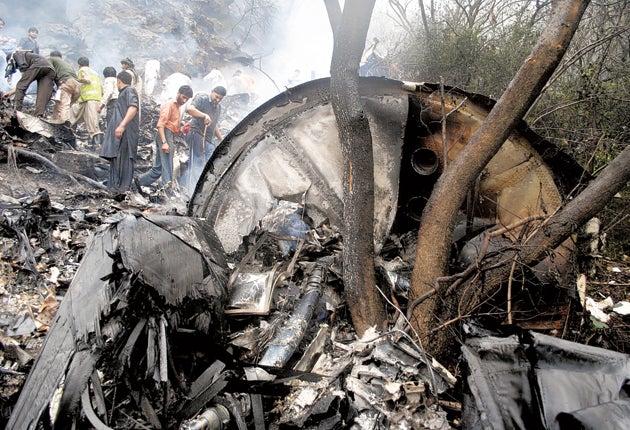Air traffic blunder may have caused crash that left 152 dead in Pakistan

Pakistan is marking a national day of mourning after the largest plane crash in the country's history yesterday left no survivors.
Airblue flight 202 was carrying 152 people from Karachi to Islamabad when it crashed into the Margalla Hills on the northwest edge of the capital amid heavy rain and thick fog yesterday morning.
"There are no survivors," Rehman Malik, the Interior Minister, told reporters. Several hours after the crash, rescue workers were still combing through the devastation amid the heavily forested area in search of bodies. The plane had been carrying 146 passengers and six crew-members.
So far, some 100 dead bodies have been recovered, but bad weather frustrated rescue efforts as nightfall was setting in.
"We have suspended the air operation because of rain," a senior Islamabad official, Aamer Ali Ahmed, said. "There's no way to transport bodies from the site except via helicopters and even helicopters can't land there."
The precise reasons for the crash were yet to be established. Mr Malik suggested that there was some confusion between air traffic control at Islamabad's Benazir Bhutto International airport and the pilot of the Airblue airline's Airbus A321.
But as a pall of gloom settles on Pakistan this morning, troubling questions remain for the families of the dead mourning their loss. Given the bad weather, many ask why the plane was not diverted, as two earlier flights had been. Local news channels also asked whether Pervez Iqbal Chaudhry, the flight's captain, who had been hired years after retiring from Pakistan International Airlines (PIA), the national carrier, was too old to be flying.
Ejaz Haroon, the managing director of PIA, also wondered if proper procedures had been followed. "If you look at the position of the wreckage it's clear that the plane went beyond safety margins," he told Reuters. "It should have manoeuvred within five miles of the runway but that did not happen."
The dead included six members of Pakistan's youth parliament, families travelling to the northern areas on holiday, and flight attendants who were the sole income-earners for their families.
The US embassy in Islamabad said that the dead included two American citizens. The consular section of the British High Commission is investigating whether there were any British citizens on the plane.
The plane lost contact with the control room at 10:43am, Islamabad time. Residents of the local area saw the plane flying perilously low before it crashed into the Margalla Hills, setting off a loud noise that was heard in the centre of the capital. For several hours, whirling plumes of white smoke could be seen rising from the crash site.
"The pilot was given directions to land either on runway one or two," Mr Malik said. "The plane was at 2,600ft before landing but suddenly it went to 3,000ft, which was unexplained."
He added that instead of approaching the airport from the "Kahuta side", a nearby town to the east, it attempted to land from "the Murree Road side", located to the north.
The plane's final moments are likely to remain a mystery until the black box flight recorder is recovered and studied. The flight had been descending as heavy monsoon rain and thick fog reduced visibility. For reasons that remain unclear, the plane turned northwards, flying for some 10 miles before crashing into the hills.
Airblue, the private carrier that owned the plane, maintained that poor weather was to blame for the crash. The private airline, which also flies to Britain among other international destinations, is well regarded and boasts a fleet of modern planes. The Airbus flying from Karachi was eight years old. It was the airline's first crash.
Grief and panic animated the waiting areas at Karachi and Islamabad airports and the capital's hospitals as relatives and friends of the passengers spent hours anxiously awaiting news. But there were no survivors among the bodies recovered, many of them charred and disfigured beyond recognition.
For Pakistanis, the crash is the latest in a series of tragedies that has seen nearly 1,000 people die in the past six weeks. The bulk have been killed in Islamist militant bombings that have struck across the country.
Scores continue to be slain in "targeted killings" in the port city of Karachi. Monsoon floods have swept away dozens. And almost every day brings fresh reports of suicides committed by those who cannot feed themselves or their families.
Join our commenting forum
Join thought-provoking conversations, follow other Independent readers and see their replies
Comments
Bookmark popover
Removed from bookmarks